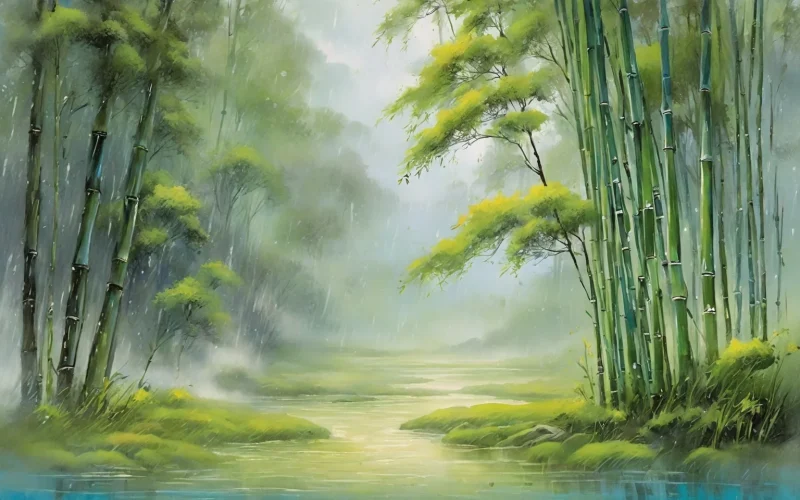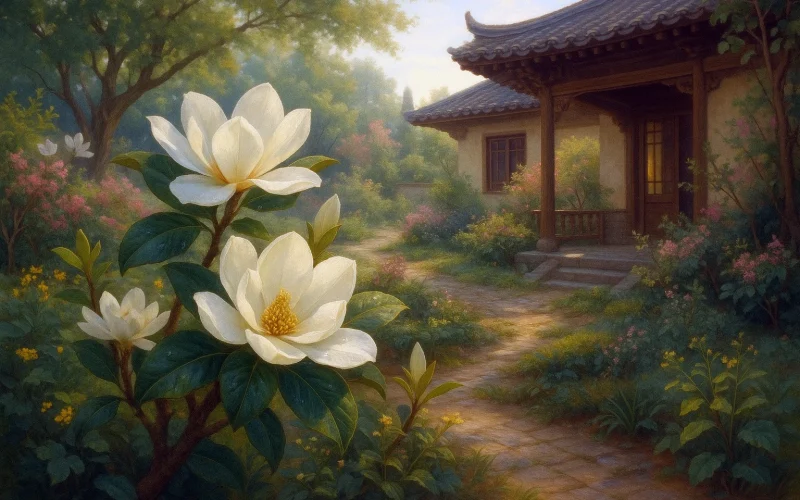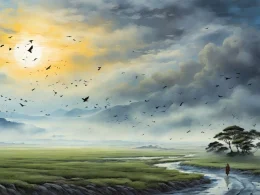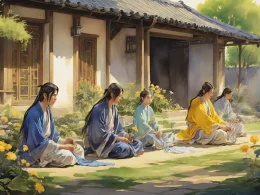Why should this spring haste away in such hurry?
The wild wind and rain have filled me with worry.
I see no bamboo shoots in groves as before,
Yet blame the three days' wind I still abhor.
Original Poem
「三月三日雨作遣闷十绝句 · 其一」
杨万里
今年春事底匆匆,雨急风颠恼得侬。
不见一林如许笋,犹嫌三日向来风。
Interpretation
Written during the Chunxi era of the Southern Song Dynasty. In his later years, Yang Wanli often lived in exile in Lingnan, where his circumstances were modest, and he frequently encountered stormy weather, leading to periods of frustration and discontent. The third day of the third lunar month was traditionally a festival for spring outings, marked by customs like walking on green grass and feasting by the water. However, the poet faced continuous rain that disrupted his plans, prompting him to write ten quatrains to vent his mood. This poem is the first of the series, expressing annoyance at the rainy weather and lamenting the swift passage of spring, revealing the poet's sensitivity and emotional fluctuations in response to nature.
First Couplet: "今年春事底匆匆,雨急风颠恼得侬。"
Jīnnián chūn shì dǐ cōngcōng, yǔ jí fēng diān nǎo dé nóng.
Why has this year’s spring been so rushed?
The driving rain and gusting wind vex me deeply.
The poet first laments the swift passage of spring, then describes the sudden storm, conveying his frustration with the season’s unpredictability in a direct and candid tone.
Second Couplet: "不见一林如许笋,犹嫌三日向来风。"
Bùjiàn yī lín rú xǔ sǔn, yóu xián sān rì xiànglái fēng.
Not a single grove shows the promised bamboo shoots;
Yet I still resent the unceasing wind these three days.
This couplet uses "bamboo shoots" as a symbol of spring’s vitality—本该 (should have) flourished but were thwarted by the storm, mirroring the poet’s dashed expectations.
Holistic Appreciation
Though only four lines, the poem layers the haste of spring, the disturbance of wind and rain, and the poet’s vexed mood. The first couplet begins with the season, bemoaning spring’s brevity and the storm’s intrusion; the second couplet turns to scenery, noting the absence of bamboo shoots and the lack of spring’s vibrancy, deepening the poet’s gloom.
The verses may seem plain, but they authentically convey the poet’s state of mind amid adversity: external storms disrupt festive joy, stirring inner discontent. Yet the poet does not wallow in prolonged lament—he channels his frustration into writing ten quatrains, revealing a self-consoling impulse.
Artistic Merits
- Candid and vernacular language: Phrases like "vex me deeply" (恼得侬 nǎo dé nóng) and "so rushed" (底匆匆 dǐ cōngcōng) are distinctly colloquial, lending intimacy and vitality.
- Emotion through scenery: Wind, rain, and bamboo shoots are not just natural elements but externalizations of the poet’s inner state, blending reality and mood.
- Small reflecting large: A single day’s storm encapsulates lament for spring’s passing, expanding into philosophical reflection on time’s transience.
- Concisely structured: Four lines form a complete quatrain, unadorned yet with a coherent flow, showcasing the genre’s condensed beauty.
Insights
This poem reminds us that natural changes often affect our emotions, but life’s irritations need not linger. Yang Wanli channeled his frustration into poetry, transforming annoyance into art. For us, too, life’s frustrations can be converted through art, writing, or other means, easing the mind and uplifting the spirit.
About the Poet

Yang Wanli (杨万里 1127 - 1206), a native of Jishui in Jiangxi, was a renowned poet of the Southern Song Dynasty, celebrated as one of the "Four Great Masters of the Restoration" alongside Lu You, Fan Chengda, and You Mao. He attained the jinshi degree in 1154 and rose to the position of Academician of the Baomo Pavilion. Breaking free from the constraints of the Jiangxi School of Poetry, he pioneered the lively and natural "Chengzhai Style," advocating for learning from nature and employing plain yet profound language. His poetry, often drawing inspiration from everyday life, profoundly influenced later schools of lyrical expression, particularly the Xingling (Spirit and Sensibility) School.












